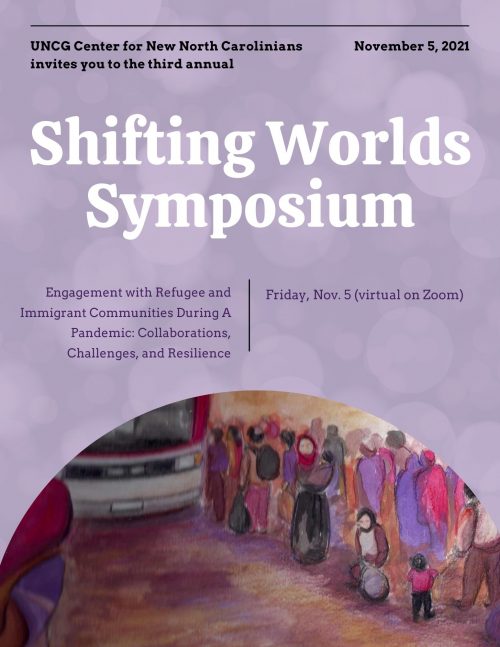The CNNC hosted its third annual Shifting Worlds Symposium. This year’s symposium was titled “Engagement with Refugee and Immigrant Communities during a Pandemic: Collaborations, Challenges, and Resilience” and included sessions dedicated to discussing support and services accessibility to immigrant and refugee communities. The CNNC received nineteen proposal submissions from professors, practitioners, and students. Nearly two hundred individuals registered to attend the sessions throughout the day.
Dr. Sonalini Sapra opened the symposium by thanking all participants and attendees before introducing the first keynote speaker, Dr. Cristina Santamaría Graff. Dr. Santamaría Graff is an Associate Professor of Special Education, Urban Teacher Education at Indiana University-Purdue University Indianapolis (IUPUI). Her presentation was titled “Whose Knowledge Counts?: (Re)positioning Immigrant Family Voices in Higher Educational Settings.” In her speech, Dr. Santamaría Graff discussed her “Family as Faculty” (FAF) approach which challenges institutional hierarchies in higher education. Through this framework, Dr. Santamaria Graff explored ways to integrate community-engaged teaching in university and college classes by recentering the lived experiences and expertise of immigrant and refugee families.
Dr. Aurora Santiago-Ortiz was the closing keynote speaker. Dr. Santiago-Ortiz received her PhD from the Social Justice Education program at the University of Massachusetts Amherst in 2020. In her presentation titled, “Anti-Decolonial Approaches to Community-University Partnerships: Collaboration, Collective Agency, and Solidarity,” Dr. Santiago-Ortiz explored the potential benefits of participatory research action (PAR) and how to apply this methodology to building relationships and collaborations between faculty, students, and community members. Dr. Santiago-Ortiz emphasized this approach as a way community-university partnerships can move towards reciprocal and sustained alliances. Dr. Diya Abdo closed the symposium by thanking participants, session chairs, attendees, and the keynote speakers.
Many of the panel presentations addressed themes similar to those explored by Dr. Santamaría Graff and Dr. Santiago-Ortiz in their keynote speeches. Several presentations explored new approaches of engaging with refugee and immigrant communities. These presentations examined the importance of easily accessible services including interpreters, therapy and mental health support, and cultural brokers who can navigate and “translate” cultural norms between communities and researchers. Each presentation introduced new methods, approaches, and ways of rethinking services for refugees and immigrants and how these methods can be applied to further engage with these communities.
Dr. Santamaría Graff and Dr. Santiago-Ortiz also led a workshop and provided suggestions to the CNNC’s “Guidance for Engaging Immigrant and Refugee Communities” document. In collaboration with researchers and practitioners, the CNNC Fellows and staff created a rubric as a starting point and guidance for engaging with immigrant and refugee communities. The purpose of this rubric is to suggest and encourage best practices for reciprocity and power-sharing between researchers and communities. These questions are not meant solely for vetting, but to encourage reflection about best practices for ethical engagement with refugee and immigrant communities.
Once again, we would like to thank the keynote speakers for sharing their knowledge and expertise, the participants for submitting exceptional presentations, the session chairs for helping facilitate the sessions, and the registrants for their time and participation.
We look forward to continuing these engaging conversations.
Ashley Loper-Nowak | Graduate Assistant
To view the sessions, please follow the links below.
2021 Shifting Worlds Symposium Program
Opening Remarks/Dr. Cristina Santamaría Graff Keynote Address
Session I
Session II
Session III
Session IV
Session V
Session VI
Session VII
Session VIII
Session IX
Session X
Duke University Student Panel
Workshop
Closing Remarks/Dr. Aurora Santiago-Ortiz Keynote Address
